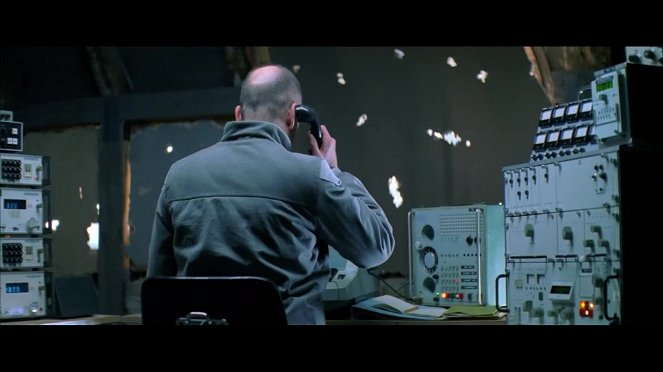Directed by:
Florian Henckel von DonnersmarckScreenplay:
Florian Henckel von DonnersmarckCinematography:
Hagen BogdanskiCast:
Ulrich Mühe, Sebastian Koch, Martina Gedeck, Ulrich Tukur, Thomas Thieme, Charly Hübner, Martin Brambach, Herbert Knaup, Volker Michalowski, Werner Daehn (more)VOD (1)
Plots(1)
Before the collapse of the Berlin Wall, East Germany's population was closely monitored by the State Secret Police (Stasi). Only a few citizens above suspicion, like renowned pro-Socialist playwright Georg Dreyman, were permitted to lead private lives. But when a corrupt government official falls for Georg's stunning actress-girlfriend, Christa, an ambitious Stasi policeman is ordered to bug the writer's apartment to gain incriminating evidence against the rival. Now, what the officer discovers is about to dramatically change their lives - as well as his. (official distributor synopsis)
(more)Videos (2)
Reviews (6)
Engagingly shot and I think it faithfully portrays all the negative aspects of the police state, but otherwise I have one big problem with this film. I did not believe at all the transformation of a heartless spook into the essence of virtue, who even sheds a tear to the sound of moving music, and the ending with the "dedication" falls somewhere into the realm of unbelievability and incomprehensibility. But thanks to the sensitive direction, the almost two and a half hours were easily digestible, even though the dialogues and the whole concept of the story were a bit daft.
()
The Lives of Others was a strong emotional experience for me and represents the peak of reflection on the communist past of Central Europe. Compared to the thematically similar Czech film Kawasaki's Rose, Hřebejk's film significantly lags behind in terms of understanding the subject, quality of execution, and approach to reality. His film does not surpass the Czech borders and participation in several festivals, whereas Donnersmarck's masterpiece is sufficiently internationally and interculturally comprehensible to convey knowledge about communist dictatorship on a global scale. And I truly do not have the slightest feeling that The Lives of Others was filmed with Oscar ambitions. In the case of this drama, it is not essential whether such a story actually took place because the story of the Stasi officer serves the director to reveal the mechanisms of state surveillance and manipulation of citizens, while also addressing morality on a general level, which is a timeless and universal theme. There are many great scenes where the temptation of power and conflict between moral values and the reality of the regime clearly collide in their details, e.g., the elevator scene where the investigator meets a little boy. "You work for the Stasi?" - "You don't even know what that is." - "Daddy says they lock up decent people there." - "And what's his name?" - "Who?" - "The balloon you're holding." The film is in its own way brilliant in its minimalist approach and allows the viewer different interpretations of motifs and actions of the film characters. One of the many myths related to that time divides the population into "us" and "them" and demonizes members of the secret police and repressive forces. The difficulty lies in the fact that in reality, they did not differ significantly from the rest of the population. I knew one Stasi officer, and it must be admitted that I wouldn't want to spend a vacation with him, but in our professions and in everyday life, I have met people who had a significantly more distorted value system, but fortunately, they have never pursued such a profession. That Stasi officer already had a certain value system before, which may not have corresponded to what we would identify with, but he certainly did not consider himself an immoral monster. He just once did something that was not in line with his official duties, and then there was no escape from the path he had taken. And his nature did not fundamentally change with that turning point in his life. Overall impression of this superbly directed and flawlessly acted emotional film: 100%.
()
The lives of the latter struck me as incredibly emotional at the end, and I am thus able to forgive them for some of their minor ills (playing the piano with the line "How could anyone who really hears this be a bad person?" for example). The arts are really what suffered the most under the Red Pigs, and this film for me quite accurately conveys the paranoid atmosphere that intellectuals with talent had to live in at that time. This film should be required to be shown in schools, although I don't think anything can move a moron. Ulrich Mühe played one of the saddest characters I've seen in a long time. I really applaud him.
()
It was no gripping and moving experience, but this film following true events from a difficult, tension-ridden time does have its power, and the credit goes mainly to the superb performances. I always thought the Germans were completely plankish as actors, but this film has a bunch of people who really know how to act. The story is not very interesting, but it’s very well filmed and will make you await eagerly for the final reveal. I don’t think it’s brilliant work of art, but its concept beats many more famous spy films.
()
In recent years German cinema has been making massive efforts and every year it manages to produce one or two really high quality pictures. The Lives of Others is just such a picture, mainly thanks to the topic they deal with. The very first scene when the theory of interrogating “subversives" is cut with a real interrogation is great. It is in these scenes where we learn how the Stasi worked and what methods it used that the picture is at its most powerful. Unfortunately, the makers relatively soon abandon this and continue in the style of a classic drama, not getting back onto the same rails we wanted the whole picture to run on until toward the end. I found the Gerd Wiesler character bewildering. Although Ulrich Mühe does a very good job, somehow I couldn’t understand from the movie why he starts behaving how he behaves from the very beginning of the interrogation and what motives led him to behave that way. Why does an unfeeling interrogation machine turn become a “good person"? From persuasion and realization, for love in just because he has the power? If I hadn’t read the official distributor’s text, I wouldn’t even know (and in my opinion what the distributor claims isn’t in the movie). Despite all of the above shortcomings, this is a picture worth watching. Although a chamber piece, it isn’t boring and it’s very well acted by all concerned. Added to that it has really effective music and camera, which shoots everything with faded and cold tones of color which is really atmospheric. In the end, this is almost a classic bugging thriller set in an interesting environment. But still I can’t help feeling that if the makers had kept the whole movie on the same wave as it was at the beginning, we would be looking at a much better movie altogether. But this way it isn’t at all disappointing, quite the opposite.
()



Ads